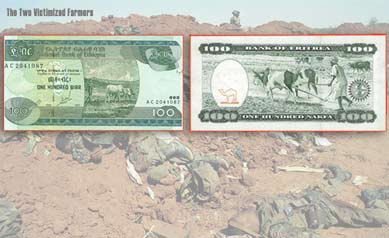Was An “Extraordinary Threat” To US National Security Visiting DC?
Unconfirmed reports (now confirmed, minutes after this news was published) indicate that on September 25th, Yemane Gebreab, special advisor to Eritrean president Isaias Afwerki, held a meeting at the Eritrean Cultural and Community Center (ECCC) in Washington, DC.
Along with 10 individuals, Yemane Gebreab was described as an “extraordinary threat” to American national security in a presidential order signed by President Barack Obama on April 13, 2010. Executive Order 13536 was drafted as a means to combat the deteriorating condition in Somalia and it directs the Treasury Department to freeze the assets of the suspects.
Along with Eritrea’s Foreign Minister, Osman Saleh, Yemane Gebreab was attending the 65th session of the UN General Assembly on September 21, 2010. Following the conclusion of the session, the two followed two itineraries.
The Foreign Minister hosted a meeting with Eritrean supporters of the Eritrean regime in New York City. At the meeting, the Foreign Minister said that Eritrea was engaged in a campaign to rebuff the U-S-engineered unwarranted and unjust sanctions in continuation of Washington’s adventurous policies in the Horn region.
Meanwhile, Yemane Gebreab boarded a train to Washington, DC where he met with government party members comprising of Eritrean youth and Eritrean women at the ECCC.
A few years ago, Yemane Gebreab formed the Youth People’s Front for Democracy & Justice (YPFDJ), a group which has been equated to “Hitler Youth” by its critics due to its uncritical adulation of Eritrean president Isaias Afwerki.
Beyond the call to freeze assets and banning the transfer of funds to, from or through the suspects, it is not clear whether the Executive Order restricts the movement of Yemane Gebreab and the 9 other individuals named in its annex.
Background
 The ECCC, which is located at L and 6th streets in Northwest Washington, DC, serves as a cafe, a bingo parlor and a general hangout for Eritreans. The center has “leased” space to Eritrean government officials and party functionaries on the second floor. In April 13, 2004, suspecting that the ECCC was involved in illegal wire transfers, US law enforcement officials raided the second-floor office and confiscated documents and cash.
The ECCC, which is located at L and 6th streets in Northwest Washington, DC, serves as a cafe, a bingo parlor and a general hangout for Eritreans. The center has “leased” space to Eritrean government officials and party functionaries on the second floor. In April 13, 2004, suspecting that the ECCC was involved in illegal wire transfers, US law enforcement officials raided the second-floor office and confiscated documents and cash.
This was a low point in the relationship between Washington and Asmara. Between 2001 and 2003, the Eritrean regime was aggressively soliciting the United States to be its African base for its counter-terrorism campaigns. In December 2002, then-Secretary of Defense Donald Rumsfeld visited Asmara and had complimentary things to say about the Eritrean dictator. Meanwhile, a couple of magazines including The Atlantic and National Review Online (which uproariously referred to the dictatorship as a “free market democracy”) pushed the argument that the Isaias Afwerki regime is a reliable ally of the United States.
When the Bush administration was less than persuaded by these arguments, the Eritrean regime employed high-powered American lobbyist Greenberg Traurig at $50,000 a month to influence US policy and to argue its case that Eritrea should be the East African base of American counter-terrorism operations.
When all of that failed, the Eritrean government decided to attract US attention by playing an aggressively spoiler role in Somalia. The strategy was to convince the United States that there would be no peace in the Horn of Africa unless Eritrea is listened to. But the strategy has backfired and the Eritrean regime has been placed under restrictive UN sanctions limiting the movement of its officials, freezing its assets, and placing an arms embargo on the nation. The Somalia Monitoring Group has been renamed the Eritrea Somalia Monitoring Group and there is a sanctions committee authorized to enforce UN Resolution 1907.





Awate Forum